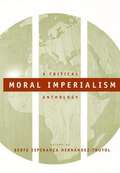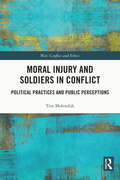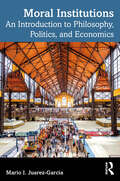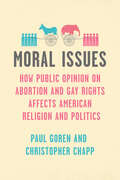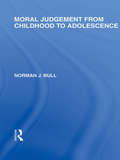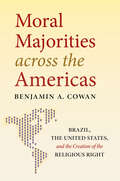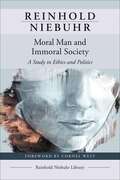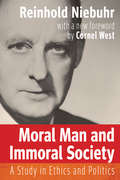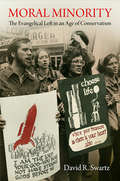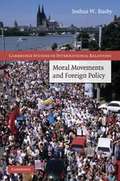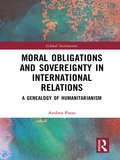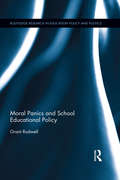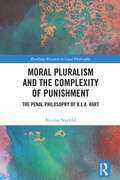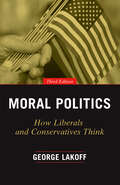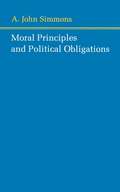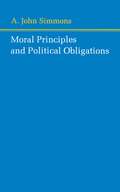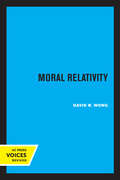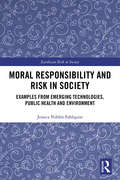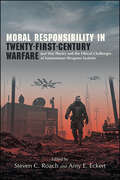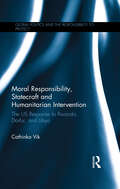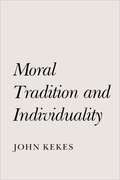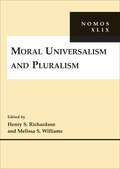- Table View
- List View
Moral Imperialism: A Critical Anthology
by Berta Esperanza Hernández-TruyolIn the controversy over female genital mutilation, Congress was quick to condemn practices throughout Africa and the Middle East and to take action criminalizing the practice domestically. Yet at the same time, it bluntly dismissed Amnesty International and Human Rights Watch when they pointed out human rights violations closer to home in the form of the disproportionately high rate of the imposition of capital punishment on black men, and the disempowerment of poor women under new draconian welfare rules. The irony of the United States' international condemnation of types of activities in which it engages within its own borders is not lost on Third World critics. Moral Imperialism sets out to bring an international human rights framework to the analysis of current international and domestic legal, political, and cultural crises. It explores the United States' moral supremacy during a time of clear domestic shortcomings and asks whether insisting that other nations adhere to norms that derive from dominant U. S. culture and history may harm societies--both within and outside of the U. S. --with radically different cultures and histories. Contributors include Beverly Greene, Kevin Johnson, M. Patricia Fernandez Kelly, Holly Maguigan, Boaventura De Sousa Santos, Saskia Sassen, and Eric Yamamoto.
Moral Imperialism: A Critical Anthology
by Hern�ndez-TruyolIn the controversy over female genital mutilation, Congress was quick to condemn practices throughout Africa and the Middle East and to take action criminalizing the practice domestically. Yet at the same time, it bluntly dismissed Amnesty International and Human Rights Watch when they pointed out human rights violations closer to home in the form of the disproportionately high rate of the imposition of capital punishment on black men, and the disempowerment of poor women under new draconian welfare rules. The irony of the United States' international condemnation of types of activities in which it engages within its own borders is not lost on Third World critics. Moral Imperialism sets out to bring an international human rights framework to the analysis of current international and domestic legal, political, and cultural crises. It explores the United States' moral supremacy during a time of clear domestic shortcomings and asks whether insisting that other nations adhere to norms that derive from dominant U. S. culture and history may harm societies--both within and outside of the U. S. --with radically different cultures and histories. Contributors: Beverly Greene, Kevin Johnson, M. Patricia Fernandez Kelly, Holly Maguigan, Boaventura De Sousa Santos, Saskia Sassen, and Eric Yamamoto.
Moral Injury and Soldiers in Conflict: Political Practices and Public Perceptions (War, Conflict and Ethics)
by Tine MolendijkThis book advances an interdisciplinary understanding of moral injury by analyzing the stories of military veterans of combat and peace missions. In the past decade, the concept of moral injury has emerged to address the potential moral impact of deployment. This book contributes to an interdisciplinary conceptualization of moral injury while, at the same time, critically evaluating the concept’s premises and implications. It paints an urgent and compassionate picture of the moral impact of soldiers’ deployment experience and the role of political practices and public perceptions in moral injury. It does so by drawing on the experiences of close to a hundred Dutch veterans deployed to Bosnia (Srebrenica) and Afghanistan, and analyzing their stories from the perspectives of psychology, philosophy, theology and social sciences. Ultimately, this book advances the understanding of moral, political and societal dimensions of moral injury and contributes to practical efforts aimed at its prevention. This book will be of much interest to students of ethics and war, cultural anthropology, conflict studies and international relations.
Moral Institutions: An Introduction to Philosophy, Politics, and Economics
by Mario I. Juarez-GarciaPhilosophy, Politics, and Economics (PPE) is a promising approach to understanding our complex world and addressing contemporary social issues. But what is it? This textbook aims to straightforwardly explain what PPE is to those who have never heard about it. The book uses a unified PPE approach that differs from a simple concatenation of moral philosophy, political science, and economics so that the reader can appreciate PPE’s distinctiveness. It makes salient the virtues of PPE as a unified approach through a study of two institutions that have been fundamental in making the world a better place: governments and markets. By the end, the reader will be confronted with the difficulty of finding the right answer to unprecedented questions in a morally diverse society. Hopefully, readers will be convinced that diversity of our liberal societies is what has made Open Societies peaceful and prosperous despite the permanent frustration that results from living in a complex, dynamic and uncertain world.
Moral Issues: How Public Opinion on Abortion and Gay Rights Affects American Religion and Politics (Chicago Studies in American Politics)
by Paul Goren Christopher ChappA new perspective on how beliefs about abortion and gay rights reshaped American politics. Many believe that religious and partisan identities undergird American public opinion. However, when it comes to abortion and gay rights, the reverse may be closer to the truth. Drawing on wide-ranging evidence, Paul Goren and Christopher Chapp show that views on abortion and gay rights are just as durable and politically impactful—and often more so—than political and religious identities. Goren and Chapp locate the lasting strength of stances on abortion and gay rights in the automatic, visceral emotions that the media has primed since the late 1980s. Moral Issues examines how attitudes toward these moralized issues affect, and can sometimes even disrupt, religious and partisan identities. Indeed, over the last thirty years, these attitudes have accelerated the rise of the religious “nones,” who have no religious affiliation, and promoted moral sorting into the Democratic and Republican parties.
Moral Jeopardy: Risks of Accepting Money from the Alcohol, Tobacco and Gambling Industries (International Research Monographs in the Addictions)
by Peter J. AdamsTobacco, alcohol and gambling corporations have been highly effective in stalling, diverting and blocking public health measures. This book provides an original and engaging exposé of the ethical issues faced by people and organizations when they accept industry money in ways that facilitate corporate influence with the public and with policy makers. It starts with a detailed examination of the risks of accepting such profits and what might be done to reduce them, then moves on to introduce the concept of a continuum of 'moral jeopardy' which shifts the emphasis from accept/not accept binaries to a focus on the extent to which people are willing to accept funding. This shift encourages people to think and speak more about the risks and to develop clearer positions for themselves. The content will be helpful to those working in government agencies, addiction services, community organizations or anyone interested in reducing the harms of addictive consumption. Confronts ethical issues associated with conflicts of interest that influence many in governments, communities and universities. Develops a framework for action and intervention aimed at reducing moral jeopardy. Draws on psychology, philosophy, public health, social theory and addiction studies.
Moral Judgement from Childhood to Adolescence (International Library of the Philosophy of Education Volume 5)
by Norman J. BullOriginally published in 1969 this book analyzes the development of moral judgement in children and adolescents. Interviews were held with 360 children aged 7 to 17, with equal numbers of either sex. Original visual devices were planned to elicit judgements in moral areas known to be of universal significance, such as the value of life, cheating, stealing and lying. In addition, analyses of concepts of reciprocity, of the development of conscience and of specificity in moral judgement were derived from the tests. The book inlcudes a critical survey of previous work in this field and places the research in its wider philosophical, psychological and sociological context.
Moral Majorities across the Americas: Brazil, the United States, and the Creation of the Religious Right
by Benjamin A. CowanThis new history of the Christian right does not stop at national or religious boundaries. Benjamin A. Cowan chronicles the advent of a hemispheric religious movement whose current power and influence make headlines and generate no small amount of shock in Brazil and the United States. These two countries, Cowan argues, played host to the principal activists and institutions who collaboratively fashioned the ascendant religious conservatism of the late twentieth century. Cowan not only unearths the deep historical connections between Brazilian and U.S. religious conservatives but also proves just how essential Brazilian thinkers, activists, and institutions were to engendering right-wing political power in the Americas.Cowan shows that both Protestant and Catholic religious warriors began to commune in the 1930s around a passionate aversion to mainstream ecumenicalism and moderate political ideas. Brazilian intellectuals, politicians, religious leaders, and captains of industry worked with partners at home and in the United States to build a united right. Together, activists engaged in a series of reactionary theological discussions. Their transnational, transdenominational platform fostered a sense of common cause and allowed them to develop a series of strategies that pushed once marginal ideas to the center of public discourse, reshaped religious demographics, and effected a rightward shift in politics across two continents.
Moral Man and Immoral Society, A Study in Ethics and Politics: A Study In Ethics And Politics
by Reinhold NiebuhrMoral Man and Immoral Society: A Study in Ethics and Politics (Library of Theological Ethics Ser.)
by Reinhold NiebuhrArguably his most famous book, Moral Man and Immoral Society is Reinhold Niebuhr's important early study (1932) in ethics and politics. Widely read and continually relevant, this book marked Niebuhr's decisive break from progressive religion and politics toward a more deeply tragic view of human nature and history. Forthright and realistic, Moral Man and Immoral Society argues that individual morality is intrinsically incompatible with collective life, thus making social and political conflict inevitable. Niebuhr further discusses our inability to imagine the realities of collective power; the brutal behavior of human collectives of every sort; and, ultimately, how individual morality can mitigate the persistence of social immorality. <P><P>This new edition includes a foreword by Cornel West that explores the continued interest in Niebuhr's thought and its contemporary relevance.
Moral Minority
by David R. SwartzIn 1973, nearly a decade before the height of the Moral Majority, a group of progressive activists assembled in a Chicago YMCA to strategize about how to move the nation in a more evangelical direction through political action. When they emerged, the Washington Post predicted that the new evangelical left could "shake both political and religious life in America." The following decades proved the Post both right and wrong--evangelical participation in the political sphere was intensifying, but in the end it was the religious right, not the left, that built a viable movement and mobilized electorally. How did the evangelical right gain a moral monopoly and why were evangelical progressives, who had shown such promise, left behind?In Moral Minority, the first comprehensive history of the evangelical left, David R. Swartz sets out to answer these questions, charting the rise, decline, and political legacy of this forgotten movement. Though vibrant in the late nineteenth century, progressive evangelicals were in eclipse following religious controversies of the early twentieth century, only to reemerge in the 1960s and 1970s. They stood for antiwar, civil rights, and anticonsumer principles, even as they stressed doctrinal and sexual fidelity. Politically progressive and theologically conservative, the evangelical left was also remarkably diverse, encompassing groups such as Sojourners, InterVarsity Christian Fellowship, Evangelicals for Social Action, and the Association for Public Justice. Swartz chronicles the efforts of evangelical progressives who expanded the concept of morality from the personal to the social and showed the way--organizationally and through political activism--to what would become the much larger and more influential evangelical right. By the 1980s, although they had witnessed the election of Jimmy Carter, the nation's first born-again president, progressive evangelicals found themselves in the political wilderness, riven by identity politics and alienated by a skeptical Democratic Party and a hostile religious right.In the twenty-first century, evangelicals of nearly all political and denominational persuasions view social engagement as a fundamental responsibility of the faithful. This most dramatic of transformations is an important legacy of the evangelical left.
Moral Movements and Foreign Policy
by Joshua W. BusbyWhy do advocacy campaigns succeed in some cases but fail in others? What conditions motivate states to accept commitments championed by principled advocacy movements? Joshua Busby sheds light on these core questions through an investigation of four cases - developing country debt relief, climate change, AIDS, and the International Criminal Court - in the G-7 advanced industrialized countries (Canada, France, Germany, Italy, Japan, the United Kingdom, and the United States). Drawing on hundreds of interviews with policy practitioners, he employs qualitative, comparative case study methods, including process-tracing and typologies, and develops a framing/gatekeepers argument, emphasizing the ways in which advocacy campaigns use rhetoric to tap into the main cultural currents in the countries where they operate. Busby argues that when values and costs potentially pull in opposing directions, values will win if domestic gatekeepers who are able to block policy change believe that the values at stake are sufficiently important.
Moral Obligations and Sovereignty in International Relations: A Genealogy of Humanitarianism (Global Institutions)
by Andrea ParasHow has contemporary humanitarianism become the dominant framework for how states construct their moral obligations to non-citizens? To answer this question, this book examines the history of humanitarianism in international relations by tracing the relationship between transnational moral obligation and sovereignty from the 16th century to the present. Whereas existing studies of humanitarianism examine the diffusion of such norms or their transmission by non-state actors, this volume explicitly links humanitarianism to the broader concept of sovereignty. Rather than only focusing on the expansion of humanitarian norms, it examines how sovereignty both challenges and sets limits on them. Humanitarian norms are shown to act just as much to reinforce the logic of sovereignty as they do to challenge it. Contemporary humanitarianism is often described in universalist terms, which suggests that humanitarian activity transcends borders in order to provide assistance to those who suffer. In contrast, this book suggests a more counterintuitive and complex understanding of moral obligation, namely that humanitarian discourse not only provides a framework for legitimate humanitarian action, but it also establishes the limits of moral obligation. It will be of great interest to a wide audience of scholars and students in international relations theory, constructivism and norms, and humanitarianism and politics.
Moral Panics and School Educational Policy (Routledge Research in Education Policy and Politics)
by Grant RodwellHow do the moral panics that have plagued school education since it’s nineteenth-century beginnings impact current school education policy? Research has shown young people to be particularly vulnerable to moral panics and, with the rise of social media, the impact of moral panics on school education is growing exponentially. Increasingly, they are reaching into the highest levels of national governments and, so powerful are their effects, some politicians choose to orchestrate them for their own political ends. For many educational administrators, the management of the ‘fallout’ of moral panics has become a time-consuming part of their day, as well as being a problematic time for parents, teachers and students. First developed by British and Canadian sociologists such as Stanley Cohen (1972), moral panic theory has evolved substantially since its early focus on adolescent deviant behaviour, and is now a part of common media talk. This book addresses the need for a single monograph on the topic, with reference to historical moral panics such as those associated with sexuality education, but also wider societal moral panics such as those associated with obesity. Teachers, students, indeed all members of school communities, along with educational administrators and politicians can learn from this study of the impact of moral panics on school educational policy.
Moral Pluralism and the Complexity of Punishment: The Penal Philosophy of H.L.A. Hart (Routledge Research in Legal Philosophy)
by Nicolas NayfeldThis book advances a new interpretation of Hart’s penal philosophy. Positioning itself in opposition to current interpretations, the book argues that Hart does not defend a mixed theory of punishment, nor a rule utilitarian theory of punishment, nor a liberal form of utilitarianism, nor a goal/constraint approach. Rather, it is argued, his penal philosophy is based on his moral pluralism, which comprises two aspects: value pluralism and pluralism with respect to forms of moral reason. It is held that this means, on the one hand, that criminal law has an irreducible complexity due to the compromises it makes to accommodate competing values, and on the other hand, that there need not be one single justification of punishment. This original interpretation is not based only on Hart’s key volume on the subject Punishment and Responsibility, but on a careful reading of his complete works. The book will be a valuable resource for academics and researchers interested in Hart’s philosophy, the philosophy of law and criminal law.
Moral Politics: How Liberals and Conservatives Think (2nd edition)
by George LakoffIn this classic text, the first full-scale application of cognitive science to politics, George Lakoff analyzes the unconscious and rhetorical worldviews of liberals and conservatives, discovering radically different but remarkably consistent conceptions of morality on both the left and right. For this new edition, Lakoff adds a preface and an afterword extending his observations to major ideological conflicts since the book's original publication, from the impeachment of Bill Clinton to the 2000 presidential election and its aftermath.
Moral Politics: How Liberals and Conservatives Think, Third Edition
by George LakoffWhen Moral Politics was first published two decades ago, it redefined how Americans think and talk about politics through the lens of cognitive political psychology. Today, George Lakoff's classic text has become all the more relevant, as liberals and conservatives have come to hold even more vigorously opposed views of the world, with the underlying assumptions of their respective worldviews at the level of basic morality. Even more so than when Lakoff wrote, liberals and conservatives simply have very different, deeply held beliefs about what is right and wrong. Lakoff reveals radically different but remarkably consistent conceptions of morality on both the left and right. Moral worldviews, like most deep ways of understanding the world, are unconscious--part of our "hard-wired" brain circuitry. When confronted with facts that don't fit our moral worldview, our brains work automatically and unconsciously to ignore or reject these facts, and it takes extraordinary openness and awareness of this phenomenon to pay critical attention to the vast number of facts we are presented with each day. For this new edition, Lakoff has added a new preface and afterword, extending his observations to major ideological conflicts since the book's original publication, from the Affordable Care Act to the wars in Iraq and Afghanistan, the recent financial crisis, and the effects of global warming. One might have hoped such massive changes would bring people together, but the reverse has actually happened; the divide between liberals and conservatives has become stronger and more virulent. To have any hope of bringing mutual respect to the current social and political divide, we need to clearly understand the problem and make it part of our contemporary public discourse. Moral Politics offers a much-needed wake-up call to both the left and the right.
Moral Principles And Political Obligations
by A. John SimmonsOutlining the major competing theories in the history of political and moral philosophy--from Locke and Hume through Hart, Rawls, and Nozick--John Simmons attempts to understand and solve the ancient problem of political obligation. Under what conditions and for what reasons (if any), he asks, are we morally bound to obey the law and support the political institutions of our countries?
Moral Principles and Political Obligations
by A. John SimmonsOutlining the major competing theories in the history of political and moral philosophy--from Locke and Hume through Hart, Rawls, and Nozick--John Simmons attempts to understand and solve the ancient problem of political obligation. Under what conditions and for what reasons (if any), he asks, are we morally bound to obey the law and support the political institutions of our countries?
Moral Relativity
by David B. WongThis title is part of UC Press's Voices Revived program, which commemorates University of California Press’s mission to seek out and cultivate the brightest minds and give them voice, reach, and impact. Drawing on a backlist dating to 1893, Voices Revived makes high-quality, peer-reviewed scholarship accessible once again using print-on-demand technology. This title was originally published in 1984.
Moral Responsibility and Risk in Society: Examples from Emerging Technologies, Public Health and Environment (Earthscan Risk in Society)
by Jessica Nihlén FahlquistRisks, including health and technological, attract a lot of attention in modern societies, from individuals as well as policy-makers. Human beings have always had to deal with dangers, but contemporary societies conceptualise these dangers as risks, indicating that they are to some extent controllable and calculable. Conceiving of dangers in this way implies a need to analyse how we hold people responsible for risks and how we can and should take responsibility for risks. Moral Responsibility and Risk in Society combines philosophical discussion of different concepts and notions of responsibility with context-specific applications in the areas of health, technology and environment. The book consists of two parts addressing two crucial aspects of risks and responsibility: holding agents responsible, i.e. ascribing and distributing responsibility for risks, and taking responsibility for risk. More specifically, the book discusses the values of fairness and efficacy in responsibility distributions and makes distinctions between backward-looking and forward-looking responsibility as well as individual and collective responsibility. Additionally, it analyses what it means to take responsibility for technological risks, conceptualising this kind of responsibility as a virtue, and furthermore, explores the notion of responsible risk communication and the implications for adult-child relationships. This book will be of great interest to students and scholars of environmental ethics, bioethics, public health ethics, engineering ethics, philosophy of risk and moral philosophy.
Moral Responsibility in Twenty-First-Century Warfare: Just War Theory and the Ethical Challenges of Autonomous Weapons Systems (SUNY series in Ethics and the Challenges of Contemporary Warfare)
by Steven C. Roach; Amy E. Eckert2021 CHOICE Outstanding Academic TitleMoral Responsibility in Twenty-First-Century Warfare explores the complex relationship between just war theory and the ethics of autonomous weapons systems (AWS). One of the challenges facing ethicists of war, particularly just war theorists, is that AWS is an applicative concept that seems, in many ways, to lie beyond the human(ist) scope of the just war theory tradition. The book examines the various ethical gaps between just war theory and the legal and moral status of AWS, addresses the limits of both traditional and revisionist just war theory, and proposes ways of bridging some of these gaps. It adopts a dualistic notion of moral responsibility—or differing, related notions of moral responsibility and legitimate authority—to study the conflicts and contradictions of legitimizing the autonomous weapons that are designed to secure peace and neutralize the effects of violence. Focusing on the changing conditions and dynamics of accountability, responsibility, autonomy, and rights in twenty-first-century warfare, the volume sheds light on the effects of violence and the future ethics of modern warfare.
Moral Responsibility, Statecraft and Humanitarian Intervention: The US Response to Rwanda, Darfur, and Libya (Global Politics and the Responsibility to Protect)
by Cathinka VikThis book explores the moral complexity of statecraft in the context of decision-making on armed intervention in the post-Cold War era. This book adds to the debate on humanitarian intervention by analyzing the moral complexity of statecraft when confronted with situations of severe human rights violations. Through a comparative case study of President Bill Clinton administration’s failure to intervene in the Rwanda genocide (1994), the George W. Bush administration’s tepid response to the Darfur atrocities (2003-07), and the Barack Obama administration’s leadership behind the limited U.N. intervention in Libya (2011), it explores the factors – domestic and international – that influence decision-making about humanitarian intervention. These cases show, not only how international moral concerns often compete with interest-based and domestic concerns, but how decision-makers are often confronted by competing moral imperatives. In such situations, it is often not clear which imperatives should be followed. In an increasingly interconnected world, this book examines how we expect state leaders to balance different moral responsibilities. This book will be of much interest to students of humanitarian intervention, the Responsibility to Protect, human rights, US foreign policy, African politics and IR in general.
Moral Tradition and Individuality
by John KekesIn this study, John Kekes develops the view that good lives depend on maintaining a balance between one's moral tradition and individuality. Our moral tradition provides the forms of good lives and the permissible ways of trying to achieve them. But to do so, the author argues, we must grow in self-knowledge and self-control to make our characters suitable for realizing our aspirations. In addressing general readers as well as scholars, Kekes makes these philosophical views concrete by drawing on a rich variety of literary sources, including, among others, the works of Sophocles, Henry James, Tolstoy, and Edith Wharton. The first half of the work concentrates on social morality, establishing the conditions all good lives must meet. The second discusses personal morality, the sphere of individuality. Its development enables us to discover what is important to us and how we can fit our personal aspirations into the forms of life our moral tradition provides. Kekes's argument derives its inspiration from Aristotle's objectivism, Hume's emphasis on custom and feeling, and Mill's concentration on individuals and their experiments in living. This book is a nontechnical yet closely reasoned attempt to provide a contemporary answer to the age-old question of how to live well.
Moral Universalism and Pluralism: NOMOS XLIX (NOMOS - American Society for Political and Legal Philosophy #9)
by Melissa S. WilliamsMoral universalism, or the idea that some system of ethics applies to all people regardless of race, color, nationality, religion, or culture, must have a plurality over which to range—a plurality of diverse persons, nations, jurisdictions, or localities over which morality asserts a universal authority. The contributors to Moral Universalism and Pluralism, the latest volume in the NOMOS series, investigate the idea that, far from denying the existence of such pluralities, moral universalism presupposes it. At the same time, the search for universally valid principles of morality is deeply challenged by diversity. The fact of pluralism presses us to explore how universalist principles interact with ethical, political, and social particularisms. These important essays refuse the answer that particularisms should simply be made to conform to universal principles, as if morality were a mold into which the diverse matter of human society and culture could be pressed. Rather, the authors bring philosophical, legal and political perspectives to bear on the core questions: Which forms of pluralism are conceptually compatible with moral universalism, and which ones can be accommodated in a politically stable way? Can pluralism generate innovations in understandings of moral duty? How is convergence on the validity of legal and moral authority possible in circumstances of pluralism? As the contributors to the book demonstrate in a wide variety of ways, these normative, conceptual, and political questions deeply intertwine.Contributors: Kenneth Baynes, William A. Galston, Barbara Herman, F. M. Kamm, Benedict Kingsbury, Frank I. Michelman, William E. Scheuerman, Gopal Sreenivasan, Daniel Weinstock, and Robin West.
